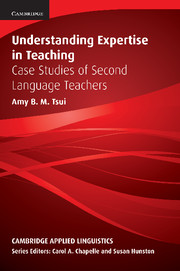Book contents
- Frontmatter
- Contents
- Series Editors' Preface
- Acknowledgments
- Chapter 1 Introduction
- Chapter 2 Conceptions of Expertise
- Chapter 3 Characteristics of Expert and Novice Teachers
- Chapter 4 Teacher Knowledge
- Chapter 5 The Case Studies
- Chapter 6 The Professional Development of the ESL Teachers
- Chapter 7 Teacher Knowledge and Managing the Classroom for ESL Learning
- Chapter 8 Teacher Knowledge and the Enactment of the ESL Curriculum
- Chapter 9 Taking on the Challenge: Exploring Process Writing
- Chapter 10 Understanding Expertise in Teaching
- Appendix 1 Reader's Comment Form on First Draft for the Second Writing Task (Angel's First Draft)
- Appendix 2 Learner Training in Making Revisions
- References
- Index
Chapter 1 - Introduction
Published online by Cambridge University Press: 05 October 2012
- Frontmatter
- Contents
- Series Editors' Preface
- Acknowledgments
- Chapter 1 Introduction
- Chapter 2 Conceptions of Expertise
- Chapter 3 Characteristics of Expert and Novice Teachers
- Chapter 4 Teacher Knowledge
- Chapter 5 The Case Studies
- Chapter 6 The Professional Development of the ESL Teachers
- Chapter 7 Teacher Knowledge and Managing the Classroom for ESL Learning
- Chapter 8 Teacher Knowledge and the Enactment of the ESL Curriculum
- Chapter 9 Taking on the Challenge: Exploring Process Writing
- Chapter 10 Understanding Expertise in Teaching
- Appendix 1 Reader's Comment Form on First Draft for the Second Writing Task (Angel's First Draft)
- Appendix 2 Learner Training in Making Revisions
- References
- Index
Summary
In all professions there are people who perform exceptionally well and whose performance is regarded as exemplary, to be emulated by fellow members in the profession, particularly novices. These people are often referred to as experts. When we say people are experts in their profession, we expect them to possess certain qualities, such as being very knowledgeable in their field; being able to engage in skillful practice; and being able to make accurate diagnoses, insightful analyses, and the right decisions, often within a very short period of time. However, what exactly constitutes their expertise is something that is not yet fully understood. Researchers in artificial intelligence have been trying for several decades to approximate the way the expert human mind works, but so far they have not been able to fully capture human expertise. In the past twenty years or so, expertise has become a topic that has drawn increasing attention from researchers in professional education.
Just as there are experts in other professions, there are experts in the teaching profession. As teachers or teacher educators, we have all come across teachers who are able to command students' respect, to motivate them to learn, to maintain their interest, to get them involved in tasks, and to sustain their attention, even on a hot Friday afternoon. The lessons seem to flow smoothly from one stage to another stage, integrating new information with what was covered in the previous lesson, the previous week, and even the previous year.
- Type
- Chapter
- Information
- Understanding Expertise in TeachingCase Studies of Second Language Teachers, pp. 1 - 8Publisher: Cambridge University PressPrint publication year: 2003

